|
|
|
Sort Order |
|
|
|
Items / Page
|
|
|
|
|
|
|
| Srl | Item |
| 1 |
ID:
158020
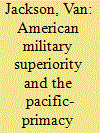

|
|
|
|
|
| Summary/Abstract |
Does the United States seek primacy in Asia? The belief that it does is widespread and long-standing. Scholars and pundits in the United States and around the world routinely reference the condition of primacy in Asia – defined here as unrivalled influence over strategic life1 – as either a means or an end of US strategy, or both. But is it accurate? This matters as much more than a semantic dispute. The presumption of Asian primacy features prominently in debates about US grand strategy. Some see it as a normative good for the United States, the only adequate means for securing US interests abroad.2 Others give the unsustainability of a condition of primacy as reason to favour retrenchment from the United States’ international commitments.3
|
|
|
|
|
|
|
|
|
|
|
|
|
|
|
|
| 2 |
ID:
114823
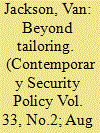

|
|
|
|
|
| Publication |
2012.
|
| Summary/Abstract |
How can one state maintain deterrence against another state undergoing an uncertain political transition? A debate within fourth wave deterrence theory focuses on whether and when a tailored approach, based on cultural, organizational, and idiosyncratic characteristics of a target state, has the greatest value. Tailored deterrence may not be appropriate under conditions of domestic political uncertainty in the target state, often those most in need of deterring. A more promising alternative for a defending state may be deterrence management. Deterrence management compensates for insufficient or low-confidence assessments of a target's values, organizational structure, power distribution, or cultural idiosyncrasies that prevent employment of tailored deterrence strategies intended to manipulate such factors. To make this case, I combine insights from deterrence theory with an exploration of the uncertain politics of a post-Kim Jong-il North Korea and the unpredictable process of power consolidation. Deterrence management may be applicable in cases of imperceptible leadership transitions in other target states. While no panacea, the deterrence management approach reinforces stability while remaining flexible enough to accommodate change.
|
|
|
|
|
|
|
|
|
|
|
|
|
|
|
|
| 3 |
ID:
158284
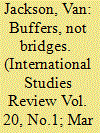

|
|
|
|
|
| Summary/Abstract |
Why might bilateral antagonism prove resilient to incentives for improvement from multilateral cooperation with shared third parties? Prominent theories predict that two actors with a record of cooperation in multilateral contexts would cooperate bilaterally as well; multilateralism is generally thought harder than bilateralism and provides opportunities for exposure and socialization that can facilitate preference convergence. This article presents Japan–South Korea relations as a deviant case for such expectations in the cooperation literature. Rather than think of multilateral cooperative contexts as “bridges” that facilitate closer, positive relations between actors, this case shows that multilateralism can instead be a “buffer” between two actors with negatively valenced ties, mediating bilateral friction sufficient to facilitate functional cooperation while insulating antagonistic national discourses or bilateral policies from pressures for change. In the case of Japan–South Korea relations, a pattern of simultaneous cooperation (with shared third parties) and friction (in bilateral interactions) over the same period illustrates a potential buffering logic of multilateralism; the multiparty context diffuses accountability for cooperative behavior that might otherwise generate domestic audience costs and allows policy elites to frame cooperation in a way that downplays or ignores the other.
|
|
|
|
|
|
|
|
|
|
|
|
|
|
|
|
| 4 |
ID:
192891
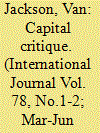

|
|
|
|
|
| Summary/Abstract |
Advocates of progressive political economy agree that the neo-liberal economic order has worsened environmental degradation, worker precarity, and oligarchy, but what are the alternatives? This article relates left-progressive discourses about concrete approaches and policy ideas to implications for the global economic order. While progressives explicitly seek a more social democratic global order, the various policy initiatives in the progressive imaginary implicitly involve approaches to order-building that are in scarcely acknowledged competition with one another. While neo-Keynesianism, justice for the Global South, a Global Green New Deal, and degrowth are all anti–neo-liberal approaches that pursue the same broad aims—reducing inequality within the Global North, raising standards of living and buffering structural violence in the Global South, and responding to the climate crisis—these goals potentially exhibit the tensions of a trilemma.
|
|
|
|
|
|
|
|
|
|
|
|
|
|
|
|
| 5 |
ID:
184098


|
|
|
| 6 |
ID:
108053
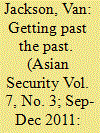

|
|
|
|
|
| Publication |
2011.
|
| Summary/Abstract |
Why are some nations able to move beyond historical hatreds to have productive relationships with former enemies while others seem bound by the past, unable to make policy choices that are in their "objective" interest? This article explores Korea's decision to normalize diplomatic relations with Japan in 1965 and finds, inter alia, that US pressure for normalization was not the key causal variable that it has been described as elsewhere. I propose that the concept of policy frontiers - that is, socially constructed constraints on realistic policy choices - reveals that a fuller explanation of Korea's decision to normalize relations with Japan resulted from a process in which policy entrepreneurs interact with their political systems to exploit opportunities created by critical junctures.
|
|
|
|
|
|
|
|
|
|
|
|
|
|
|
|
| 7 |
ID:
188880
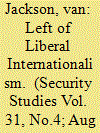

|
|
|
|
|
| Summary/Abstract |
This article brings leftist-oriented foreign policy ideas into dialogue with mainstream grand strategy literature. It argues that American progressives seek a durable security comprised of peace, democracy, and equality, meaning the grand strategies discoverable within progressive thinking are ultimately projects of worldmaking. Since leftist thought is eclectic, it gives rise to not one but three ideal-type progressive grand strategies. Progressive pragmatism treats oligarchy and kleptocracy as threats, sustains military commitments to democratic allies only, and prioritizes equality at the level of the global political economy. Antihegemonism is a project of robust restraint, positing that US power per se makes the United States and others less secure. Peacemaking aims to change the valence of world politics. It combines a cooperative security regime and gradual disarmament with nonviolent peacebuilding and support for democracy movements. These modes of progressive reasoning entail their own assumptions, wagers, and risks.
|
|
|
|
|
|
|
|
|
|
|
|
|
|
|
|
| 8 |
ID:
152377
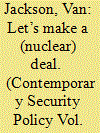

|
|
|
|
|
| Summary/Abstract |
An institutional perspective on nuclear deterrence cooperation within alliances has the potential to fundamentally reorient how we think about analyzing nuclear and deterrence decision-making between nuclear patrons and non-nuclear clients. It comes at a time when the presidency of Donald Trump is sure to test many of the core claims and assumptions in security studies, especially relating to bargaining and credibility within alliances. This article surveys questions that will be core to the research agenda involving alliance institutions and nuclear weapons during the Trump presidency and beyond.
|
|
|
|
|
|
|
|
|
|
|
|
|
|
|
|
| 9 |
ID:
112863


|
|
|
|
|
| Publication |
2012.
|
| Summary/Abstract |
When is a two-track policy approach of coercion and conciliation more or less likely to achieve its target objective? The first North Korean nuclear crisis of 1993-94 reveals that a U.S. policy approach combining coercive and conciliatory diplomacy contributed to near-term U.S. policy objectives when conciliation was offered to North Korea in order to signal benign intent. This case also reveals two additional conditions that can hinder a two-track policy from achieving its policy aims: shifting how the objectives of coercive signals and actions are prioritized throughout the course of a crisis, and relying on international institutions and foreign governments for the implementation of a two-track policy.
|
|
|
|
|
|
|
|
|
|
|
|
|
|
|
|
| 10 |
ID:
138098
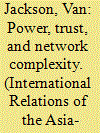

|
|
|
|
|
| Summary/Abstract |
Why do hedging strategies appear so pervasive in Asia? This article argues that hedging – not balancing or bandwagoning – is the central tendency in Asian international relations, offering three different lenses for making sense of this phenomenon, focusing in particular on the third: power transition theory, mistrust under multipolarity, and complex networks. Each perspective highlights different factors that explain the incentives for Asian states to hedge, what hedging looks like, and how long hedging is likely to endure. Power transition theory tells us that hedging is the result of uncertainty about a possible power transition between the United States and China. Multipolarity points us to uncertainty about the intentions of a growing number of states. And the logic of complex networks explains hedging as a response to the topology of Asia’s complex network structure – consisting of sensitivity, fluidity, and heterarchy – which makes it difficult for Asian-foreign policy elites to assess the future consequences of present day commitments.
|
|
|
|
|
|
|
|
|
|
|
|
|
|
|
|
| 11 |
ID:
170112


|
|
|
|
|
| Summary/Abstract |
Following the collapse of diplomatic negotiations with North Korea in 2012, the Obama administration settled on a policy approach dubbed "strategic patience." That policy involved the gradually escalating application of nonviolent means of coercion as the North Korean nuclear problem that it purported to arrest grew more acute over time. But what led the Obama administration to adopt this confrontational yet timid approach to North Korea? Using a configurational analysis, this article proposes that the Obama-era policy of "strategic patience" had little to do with North Korea per se, and instead derived primarily from the intersection of three different factors: the prioritizations necessary as part of the US "rebalance to Asia" strategy; fear that South Korean aggression would pull the United States into an unwanted war in Korea; and a prevailing belief among many policymakers that the North Korean regime would eventually collapse under the pressures of its own contradictions. This combination of priorities and beliefs led the Obama administration to treat the North Korean nuclear issue seriously but not urgently, resorting to actions incommensurate with the nature of the problem.
|
|
|
|
|
|
|
|
|
|
|
|
|
|
|
|
| 12 |
ID:
146233
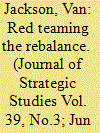

|
|
|
|
|
| Summary/Abstract |
What specific forms of reasoning underlie the US approach to Asia, what downside risks do they imply, and to what extent can they be mitigated? This article examines the theoretical underpinnings of the US “rebalance” to Asia by categorizing US policies according to three types of logic: military power; economic liberalism; and institutionalism. It then uses international relations theory as a diagnostic tool to assess risks in these approaches. Recent efforts toward improving transparency in contested maritime areas and capacity-building of local allies and partners may address the strategy’s most acute risks, while inevitably generating more in the process.
|
|
|
|
|
|
|
|
|
|
|
|
|
|
|
|
| 13 |
ID:
154927


|
|
|
|
|
| Summary/Abstract |
This essay proposes that a turn toward historical analysis is essential for understanding the propensity for either war or peace in contemporary East Asia. It urges scholars to reorient inquiry about this question in terms of temporally sensitive processes of change and continuity, and it expresses reservations about the merits of an “Eastern” turn in international relations theory. This case is made through two supporting tasks. First, it demonstrates that the Asian security literature suffers from a number of shortcomings that stem from an overwhelming orientation toward variable-centered analysis. Second, it proposes that the conceptual tools of historical institutionalism offer a fruitful way to address the theoretical lacunae, logical missteps, and empirical puzzles in Asian security literature. The article concludes by highlighting how a stronger historical institutionalist sensibility could help augment two examples of the most “hardcore” Asian security debate: the security dilemma and a US–China power transition. The logic of historical institutionalism asserts temporality and historiography as crucial sites for not only area studies scholars, but theory testing and development as well.
|
|
|
|
|
|
|
|
|
|
|
|
|
|
|
|
| 14 |
ID:
159101


|
|
|
|
|
| Summary/Abstract |
The gray zone is not a new concept, but the term describes a broad class of nonwar yet conflictual
interactions that are historically common, if underconceptualized, ways of pursuing competitive
gains while deferring the decision for war
|
|
|
|
|
|
|
|
|
|
|
|
|
|
|
|
| 15 |
ID:
159581


|
|
|
|
|
| Summary/Abstract |
Why do states that make a deliberate effort to pursue rapprochement sometimes fail? This article dissects US–North Korea relations between 1994 and 2002 as one way to better understand how deliberate decisions to dramatically improve relations with a historical adversary go awry. This vastly understudied period in US–North Korea relations started in late 1994 with an ambitious agreement to move toward diplomatic normalization through a gradual process based on reciprocal “action for action,” abruptly ending in 2002 with mutual acrimony and the resumption of long-standing hostility. Why did reciprocity strategies by both sides in the intervening period fail to deliver the promised relational change?
|
|
|
|
|
|
|
|
|
|
|
|
|
|
|
|
| 16 |
ID:
175552


|
|
|
|
|
| Summary/Abstract |
Spheres of influence remain one of the most pervasive phenomena in the practice and history of international relations, yet only rarely have they been taken up analytically. To bring conceptual and discursive clarity, this article advances two arguments. First, it argues that spheres of influence are not a distinct form of hierarchy in international relations, but rather practices of control and exclusion that can be found within any ideal-type hierarchy. Second, these hierarchical practices are generally underspecified by those invoking the term. Different theoretical perspectives on international relations offer highly divergent ways of understanding control and exclusion, and all do so with plausible empirical mooring. Spheres of influence do not themselves denote a form of governance even if it does a form of order construction and maintenance. Any given empire, hegemonic order, or alliance may also be a sphere of influence depending on the practices that occur; the key is not to identify whether particular hierarchical traits are dispositive of one of these relational structures, but rather whether, and the extent to which, assertions of control and exclusion define the hierarchy.
|
|
|
|
|
|
|
|
|
|
|
|
|
|
|
|
| 17 |
ID:
157755


|
|
|
|
|
| Summary/Abstract |
Scholars expect that a state possessing nuclear weapons has strong incentives to
proactively attack its non-nuclear adversary rather than allow it to go nuclear. So
why has the United States not already bombed North Korea? This article presents
three different frames through which policymakers evaluate the North Korea
threat—to deterrence, to nuclear nonproliferation, and to regional stability. In each,
preventive strikes play a different primary role, and the article explains the frame–
specific risks that inhere in different “theories” of preventive strikes based on their
intended purpose. The analysis shows that, in the North Korea context, preventive
strikes are a crude and unreliable instrument of policy: any purpose preventive
strikes might serve is put in jeopardy by the strikes themselves. Past U.S. presidents
would have been unlikely to bomb North Korea even if they faced more desperate
circumstances than they did, if only because it would have required assuming risks
that historically the United States has not been willing to accept.
|
|
|
|
|
|
|
|
|
|
|
|
|
|
|
|
|
|
|
|
|